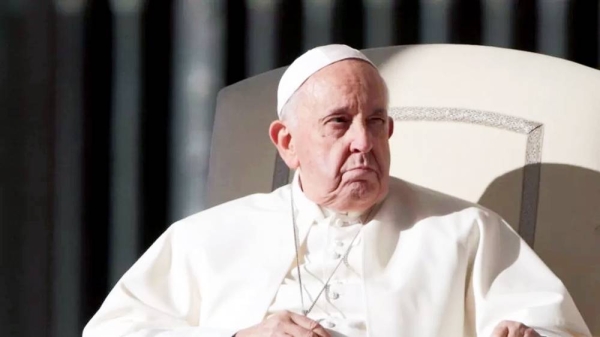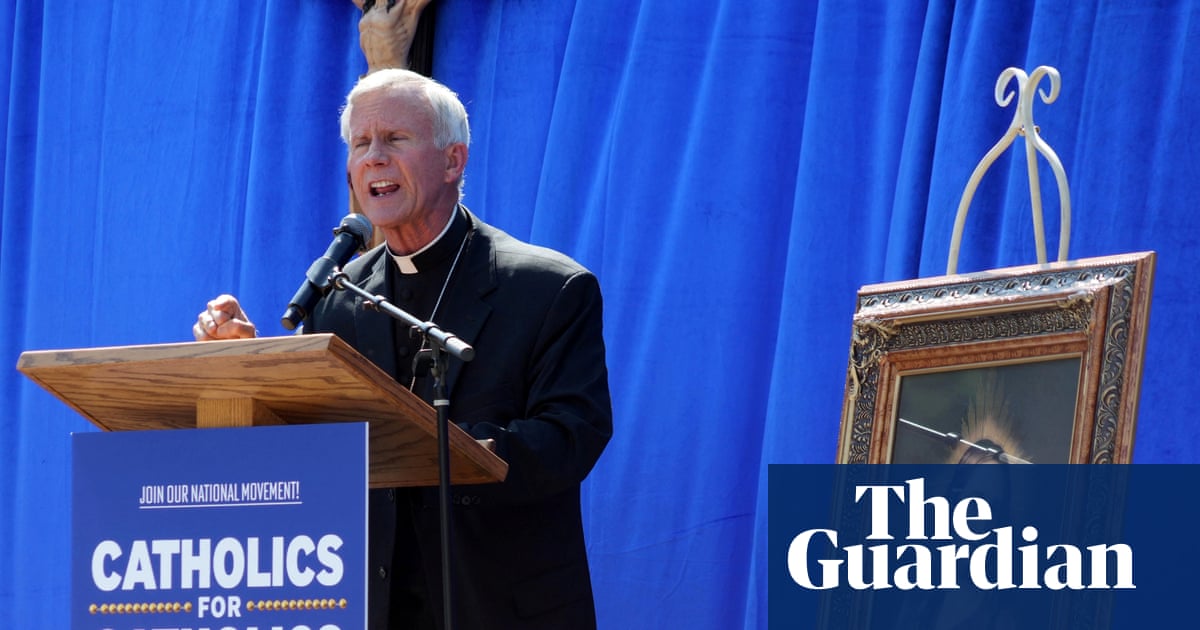
The pope accepted the resignation of West Virginia Bishop Michael Bransfield
Bishop Bransfield was implicated in court testimony in 2012 in an infamous Philadelphia priestly sex abuse case
VATICAN CITY: Pope Francis accepted the resignation of a US bishop Thursday and authorized an investigation into allegations he sexually harassed adults, adding awkward drama to an audience with US church leaders over the abuse and cover-up scandal roiling the Catholic Church.
The resignation of West Virginia Bishop Michael Bransfield was announced just as the four-member US delegation was sitting down with Francis in his private study in the Apostolic Palace. Among the four was Bransfield’s cousin, Monsignor Brian Bransfield, secretary-general of the US Conference of Catholic Bishops.
The bishop had been investigated for an alleged groping incident in 2007 and was implicated in court testimony in 2012 in an infamous Philadelphia priestly sex abuse case. He strongly denied ever abusing anyone and the diocese said it had disproved the claims. He continued with his ministry until he offered to retire, as required, when he turned 75 last week.
The Vatican said Francis accepted his resignation Thursday and appointed Baltimore Archbishop William Lori to take over Bransfield’s Wheeling-Charleston diocese temporarily. Lori said in a statement that Francis had also instructed him to “conduct an investigation into allegations of sexual harassment of adults against Bishop Bransfield.”
No details of the allegations were revealed and his diocese said it had “no idea” where Bransfield was after the Vatican ordered him to live outside the diocese.
Lori set up a hotline for potential victims to call, said the Vatican had instructed him to make the investigation public, and vowed to conduct a thorough study into what he said were “troubling” claims against Bransfield, who was a major fundraiser for the Vatican via the Pennsylvania-based Papal Foundation.
The revelation was the latest twist in an incredible turn of events in the US church that began with the June 20 announcement that one of the most prestigious US cardinals, Theodore McCarrick, had been accused of groping a teenage altar boy in the 1970s.
Francis removed McCarrick as a cardinal in July after a US church investigation found the allegation credible. After news broke of the investigation, several former seminarians and priests came forward to report that they, too, had been abused or harassed by McCarrick as adults.
The McCarrick affair — coupled with revelations in the Pennsylvania grand jury report detailing decades of abuse and cover-up in six dioceses — has fueled outrage among the rank-and-file faithful who had trusted church leaders to reform themselves after the abuse scandal first erupted in Boston in 2002.
Outrage has also been directed at Francis and the Vatican and has fueled conservative criticism of Francis’ pontificate.
The head of the US bishops conference, Houston Cardinal Daniel DiNardo, had requested the papal audience last month following revelations that McCarrick had risen through church ranks even though the allegations of sexual misconduct were known in US and Vatican circles.
DiNardo requested a full-fledged Vatican investigation into the McCarrick affair, and said he also wanted answers to allegations that a string of Vatican officials knew of McCarrick’s misdeeds since 2000, but turned a blind eye.
A statement issued by DiNardo after the papal audience made no mention of his request for a Vatican investigation. It said that the Americans briefed the pope on the “laceration” that abuse has caused and that “we look forward to actively continuing our discernment together identifying the most effective next steps.”
The statement also made no mention of the Bransfield investigation. McCarrick was a co-consecrator when Bishop Bransfield was ordained a bishop in 2005 and the two were active in the Papal Foundation, the big US fundraising organization that McCarrick co-founded and which has funneled millions of dollars to the Vatican over the years.
Bransfield was president when the foundation was thrown into disarray last year over a revolt by its lay donors. They were incensed that the cardinals who run the foundation had agreed to a $25 million request from the Vatican to bail out a troubled Rome hospital. Under pressure, the cardinals pulled the plug on the funding mid-way through.
Diocese of Wheeling-Charleston spokesman Tim Bishop said Thursday he couldn’t answer questions about Bransfield’s whereabouts or whether he has an attorney.
“The Holy See has instructed him to live outside the Diocese of Wheeling-Charleston,” Bishop said. “I have no idea of his whereabouts.”
West Virginia Attorney General Patrick Morrisey said he planned “a close review” of the latest allegations against Bransfield, which he called “disturbing.”
Joe Akers, a Catholic in West Viriginia, said the allegations are “a little unsettling.”
“I really don’t know what to think,” said Akers, an electrician from Elkview. “It says you’re innocent until proven guilty, and the other allegations again him were proven false. I’d say wait until you see what they find.
“That’s the way it is. God’s in control, so he will sort it out.”
The Vatican hasn’t responded to allegations by its former ambassador to the US, Archbishop Carlo Maria Vigano, that Francis effectively rehabilitated McCarrick from sanctions imposed by Pope Benedict XVI over allegations McCarrick would routinely invite seminarians to his beach house and into his bed.
Francis has, however, responded to the overall scandal with a series of initiatives aimed at trying to convince the faithful that he “gets it” and is prepared to take measures to put an end to what he has called the “culture of cover-up” in the church.
On the eve of the US audience, Francis announced he was summoning the presidents of bishops conferences around the world to a February summit to discuss prevention measures and protection of minors and vulnerable adults.
The surprise announcement was largely dismissed as a belated damage control effort by victims’ advocates. Church historians questioned why such an urgent problem was being scheduled for discussion six months from now with the very bishops who are blamed for much of the scandal.
“Where are the laity and others who might provide both new and uncomplicit voices and insights into the process?” asked Margaret Susan Thompson, associate professor of history at Syracuse University.
Even DiNardo’s own record on protecting children has now come into question. On the eve of his audience with Francis, The Associated Press reported that two victims in Houston had accused him of not doing enough to stop a priest who was arrested this week on sexual abuse charges.
The archdiocese issued a statement Wednesday confirming that both alleged victims had come forward to report abuse by the priest, the Rev. Manuel LaRosa-Lopez, one of them in 2001.
The delegation of US bishops announced no plans to speak to the media after their audience.












